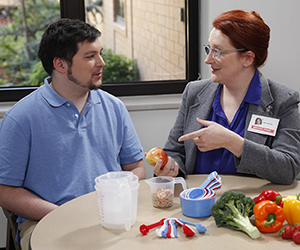Diabetes makes your body less able to use the foods you eat for fuel. As a result, sugar (glucose) builds up in the blood. Over time, having too much glucose in your blood can harm your blood vessels and kidneys. Diabetes is the most common cause for needing dialysis or a kidney transplant. But by controlling diabetes, you can stay at a healthy blood glucose level. And you can slow or prevent kidney damage.
Who's at risk?
Some people have diabetes and kidney disease at higher rates. This includes people with any of these kinds of cultural heritage:
-
Black American
-
Native American
-
Hispanic and Latin Americans
Important yearly testing
People with diabetes need their kidney function measured at least once a year. Your provider will track how much protein your kidneys release into your pee. This is a sign of how diabetes affects your kidneys. One or two times a year, you will need a blood test. This is done to see how your kidneys process other substances. Don’t skip these important tests.
Follow your food plan
To get the most energy from the foods you eat and feel your best, you may have to follow a food plan. Work closely with your healthcare team. They can help you make a food plan that's right for you.
You may need to:
-
Eat less protein.
-
Drink less fluid.
-
Limit salt (sodium) intake.
-
Eat foods that are low in phosphorus and potassium.
-
Not take or change the dose of medicines that affect or are processed by the kidneys.
If you need help with changes to what you eat and drink, talk with your healthcare provider. Ask to be referred to a registered dietitian. This person can help you make and manage those changes.
Take insulin or diabetes medicine as directed
Insulin is a hormone. It helps your body use glucose. You may need to inject insulin. This is to increase your body’s supply. Or you may take medicine to help your body release more insulin or use it better.
The stage of kidney disease can affect the amount of insulin your body needs. Your insulin or other medicine doses may be changed. Talk with your provider if your blood sugar level is often too low. Closely watch your blood sugar with a meter as directed.
Blood pressure medicine can help
There are 3 types of blood pressure medicines that help people with diabetes and high blood pressure reduce their risk of kidney disease. They can also help prevent kidney disease getting worse. These medicines are:
-
Angiotensin-converting enzyme (ACE) inhibitors
-
Angiotensin receptor blockers (ARBs)
-
Sodium-glucose co-transporter 2 (SGLT2) inhibitors
These medicines also work for people with diabetes who don't have high blood pressure.
Other ways to help your health
You can help slow kidney disease by:
-
Quitting smoking as soon as possible, if you smoke
-
Controlling high blood pressure
-
Limiting alcohol
-
Staying at a healthy body weight
-
Getting regular physical activity
Stay active
Exercise helps the body use glucose. For best results:
-
Talk with your provider before starting a fitness program.
-
Ask your provider what activities you should do. Ask how often you should exercise, and for how long.
-
Eat
1 to 2 hours before you exercise. Check your blood sugar right before you exercise. This is to see if it's safe to exercise at that time. -
Keep snacks nearby. These can help prevent low blood sugar (hypoglycemia).
-
Always wear a medical alert necklace, bracelet, or tag. It should say that you have diabetes. And it should list other health conditions as needed.


